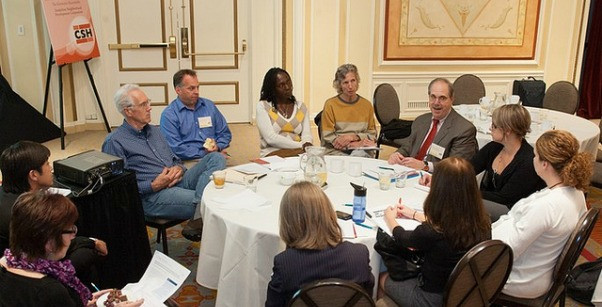On October 10 and 11, CSH gathered roughly 55 individuals representing subgrantees, partners, advisors, investors and key stakeholders for the first annual in-person convening of our Social Innovation Fund Initiative, which strives to demonstrate the potential of supportive housing connected to medical homes as a tool for improving health while reducing Medicaid and health care costs among homeless “super users” of emergency departments, hospitals and other crisis health services use.
On the first of the two-day convening, participants shared and discussed key considerations and strategies for successfully engaging and increasing housing and health stability among homeless “super user” clients, including hearing from three experts operating similar program models.

Members of the evaluation team at New York University also engaged subgrantees and participants in further explicating the Theory of Change underlying the program model. Participants also discussed various aspects of program implementation including coordinating property management and supportive services, providing health care using a patient-centered health home approach, and engaging Medicaid and managed care to pay for services in supportive housing.
The second day began with a tour of subgrantee Tenderloin Neighborhood Development Corporation’s Kelly Cullen Community (KCC). KCC is the San Francisco YMCA building rehabilitated into a 174 apartment supportive housing building co-located with a community health center and fitness center, which will provide both housing and primary and behavioral health services to the homeless high utilizers of crisis health services for CSH’s SIF demonstration. Following the tour, CSH’s subgrantees heard from a panel of health and housing policy experts regarding opportunities, challenges, and strategies for leveraging mainstream health and housing resources to sustain and scale their models. The remainder of the convening gave four subgrantee teams the opportunity to meet and strategize on next steps.
Key insights and highlights from the convening’s discussion include:
- Safe, affordable, and beautiful housing and client’s housing stability plays a central role in improving health status and reducing emergency department and hospital visits among clients with complex health conditions
- A combination of persistence and a respectful, non-judgmental attitude is critical to engaging and building trust with clients
- How motivational interviewing, informed by a harm reduction philosophy, can help clients overcome ambivalence to engage in services and make healthier choices
- There remains a significant gulf between what is recognized as healthcare and what really impacts the health, especially among people with complex needs. CSH’s SIF Initiative attempts to bridge that gulf, but must confront a significant cultural and philosophical divide between traditional medical and healthcare practice and supportive housing’s approach.
- The highly intensive approach to case management in supportive housing involving high degree of face-to-face contacts, involving techniques like motivational interviewing techniques differs significantly from the type of care coordination and care management models familiar to the health and medical sector
- Supportive housing, while highly successful in ending homelessness and addressing mental health and substance abuse, is seldom accustomed or equipped to deal with chronic disease and shifting health service use from emergency department visits to primary and preventive care.
- Partnerships between supportive housing providers and community health centers and hospitals is critical to providing a more comprehensive approach to addressing homelessness, behavioral health conditions, and chronic illness, but is only the first step. More specifics are needed around the process and approach by which these partners will coordinate and collaborate in delivering care and services.
Overall, this first annual convening was a great success, formally “kicking off” initiative implementation, bringing to the surface critical issues and challenges facing CSH, its subgrantees, and the evaluation, and inspiring initiative partners to engage in the challenging but rewarding work ahead. As one participant reflected, “I feel like we… have the in front of us the opportunity to really change the way that homelessness and supportive housing is viewed on a national level. I truly believe that it is the opportunity of a lifetime and I have a lot of confidence that we will collectively succeed in changing the face of homelessness and housing.”
CSH looks forward to working with all our initiative partners over the next few years to build an integrated health and housing solution that can both bend the Medicaid cost curve and restore stability, health, and hope to the most vulnerable men and women experiencing the dual crises of homelessness and chronic illness.



